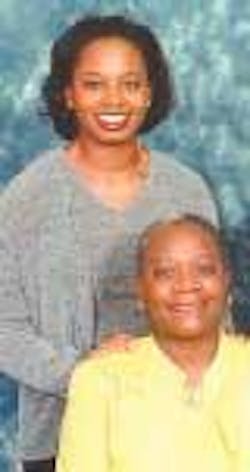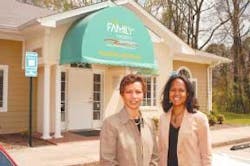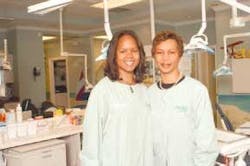Mother/Daughter—The blend of mother/daughter dentists makes a fine team
Woman Dentist Journal interviews two mother/daughter dentist teams. Dr. Carrie Brown and her daughter, Dr. Sakita Brown, were the first mother/daughter dentists to graduate from the University of Kentucky Dental School. Dr. Carrie Brown is a general practitioner in private practice in Lexington, Ky. She is a member of the ADA, Blue Grass Dental Society, Kentucky Dental Association, National Dental Association, Academy of General Dentistry, and American Academy of Cosmetic Dentistry. Dr. Sakita Brown is currently in a pediatric residency postgraduate program at the University of Alabama, College of Dentistry. She is a member of the American Student Dental Association and the Kentucky Student Dental Association, and is the community service coordinator and fundraiser chair of the Student National Dental Association. She was recently appointed chief resident for the pediatric dentistry program at the University of Alabama. Dr. Kaneta Lott, a pediatric dentist, and her daughter, Dr. Kimberly Edwards, an orthodontist, practice together in southwest Atlanta, Ga. Dr. Kaneta Lott is also an assistant clinical professor in the Department of Pediatric Dentistry at The Medical College of Georgia and has served the Georgia Board of Dentistry as a consultant. She is a Fellow in the American College of Dentists and a member of numerous professional organizations. She lectures nationally on pediatric dentistry, dental traumatology, and practice management. Dr. Kimberly Edwards studied abroad during college in Oaxaca, Mexico, and at the University of Science and Technology in Kumasi, Ghana. She was the national president of the Student National Dental Association in 2000, and completed her orthodontic residency at UNC Chapel Hill. She is engaged to be married on Sept. 4, 2004.
null
When did you first know you wanted to be a dentist?
Dr. Carrie Brown: My decision to pursue dentistry became a goal and passion for me as a result of my former profession. Late one night working as a medical technologist, I had to cross-match many units of blood for a motorcycle accident patient. The doctor on duty ordered matching well beyond the amount required to save the life of the individual involved in the accident. After cross-matching all the blood, the patient eventually died. After this experience, I decided that I needed a change in profession that would provide a predictable outcome with a greater rate of success.
Dr. Sakita Brown: I first knew I wanted to be a dentist during my junior year at Spelman College. I was a biology major, so I enjoyed science. However, I found the liberal arts fulfilling as well. Dentistry allowed a mixture of science and artistic skills, which I found to be exciting and challenging.
Dr. Kaneta Lott: I had worked as a medical technologist for a year when I realized that I desired a career in medicine where I could have a family and a career at the same time. Many of the physicians who worked in the hospital clinical laboratory were female. They actually encouraged me to go into dentistry instead of medicine because of the lifestyle pressures that women have to contend with.
null
null
Did you have a female professional mentor who was instrumental in your choice?
Dr. Sakita Brown: Yes, my mother has always been my mentor and friend. During the summer and school vacations, I would help my mom in her office. Whether it was suctioning at chairside, cleaning the office, charting, or sterilization, I was there. It didn't occur to me at the time that, "Hey, I could actually be a dentist too." I did notice how committed my mom was to her patients and to building her practice, and I soon developed respect for my mom and the profession.
Watching your mother in her practice must have had a strong effect on your decision to become a dentist. Just what about dentistry and its blend with your mother influenced you to make that career choice?
Dr. Sakita Brown: There were countless occasions where I saw how much my mom's knowledge and skills in dentistry influenced her patient's attitude toward the profession from perhaps a negative to a positive view of the dentist/patient relationship. Likewise, her energy was invigorating, because it was seen not only in the office but throughout the community with health fairs. She cared deeply about educating and providing care to people who genuinely appreciated her actions. It was this combination that influenced me to make dentistry a career.
Dr. Kimberly Edwards: I was always proud of my mother as a business owner. I was 2 years old when my mother started dental school, so I was able to witness her diligence and tenacity from dental school to her residency and then into private practice. So, in a way, we both went through it together. When she finally opened her own practice, I was just as proud as she was. I saw the emotional rewards of her getting to know her patients and sharing in their growth and successes. I was also intrigued by the detailed nature of dentistry. She taught me that "almost right" is not good enough when you are working in such a limiting environment as the mouth. On a practical note, I enjoyed the flexibility that my mother had in her schedule. She was always able to attend my special days at school. Most moms couldn't do that.
What was the best advice you received when you started in the dental field?
Dr. Carrie Brown: Upon pursuing dentistry and seriously evaluating the profession, I think the best advice I received is not to let finances and the lack of funding prevent me from pursuing my ideal profession. I have no regrets about expending capital in terms of monetary resources, stress, and emotional highs and lows in reaching my goal to become a practicing dentist. This is the same advice I gave to my daughter.
Dr. Sakita Brown:The best advice I received from my mom when I started in the dental field is to always take time with your patients — they are your primary concern as a professional.
Dr. Kaneta Lott: Plan my day so that I can start by nine and finish by five, and keep different aspects of my life in perspective. Running a practice has to be kept in perspective with family life so that one does not outweigh the other. There are times when the practice takes more time than family and when family takes more time than the practice. As long as they even out in the end, I'm pleased.
What advice did you give your daughter as she planned to go into the same field?
Dr. Carrie Brown: I have been practicing dentistry for 21 years. With all the advances in materials and technology, we can finally attest to the fact that we are truly providing holistic care for our patients. We are improving smiles, we are changing lives, and as a result, we are enhancing the quality of life. Our discussion of the profession usually moves to those related to patient benefits. We are firm in our belief that the patients and the resolutions of their health-care needs are of utmost importance.
Dr. Kaneta Lott: I gave my daughter the same advice I received, but I added that she should be sure to specialize in an area of dentistry that she loves. I followed the advice, and I'm glad that I did.
Did you take your mother's advice?
Dr. Sakita Brown: Yes, I have taken her advice. I strive to treat each patient as if he or she is the only patient in the office, simply because at that moment they deserve my full attention.
Having two dentists in the family must make for interesting conversations. Do you seek advice from each other on treatment planning, office situations, business decisions, etc.?
Dr. Sakita Brown: I seek advice about everything. My mom has been a dentist for 25-plus years. She has experienced and seen a lot, dealing not only with patients but staff and business decisions as well. I try to learn from her mistakes and apply her successes. We also converse on how to balance the profession, motherhood, being a wife, and personal time.
Dr. Kimberly Edwards: All the time! Since we are in two different specialties (mom is a pediatric dentist and I am an orthodontist), we collaborate a lot on treatment planning. It is a natural partnership. I am constantly asking her about the business side of the practice. There is so much that I have to learn. There are a few times when she will ask my opinion on a policy change that she and her partner are considering. Also, they usually ask my opinion on staff issues.
What are the changes you have seen in dentistry since you began to when your daughter started her practice?
Dr. Carrie Brown: Dentistry has changed a great deal. Via the advances in technology and improvements in dental materials, the quality of dentistry performed today is far superior to that of 20 to 30 years ago. Currently, we have the ability to offer procedures that restore and improve health and appearance. Patients are now requesting total makeovers, which result in brighter and whiter smiles. Today, the patient and dentist are partners in the treatment of dental concerns; therefore, providing dental care has become a rewarding joint decision.
Dr. Kaneta Lott: Cosmetics have become much more important. Adults are also getting more braces due to cosmetic concerns. Parents are better educated on the importance of children being treated by a pediatric dentist.
What has been or is the most challenging element in your life today?
Dr. Carrie Brown: The most challenging element in my life as a woman and a professional is achieving balance in all other aspects of life. One must continually seek balance in the professional and personal aspects of life to ensure quality in the home environment and community. We are committed to our professions and are operating in a male-dominated arena; therefore, I believe it can be extremely difficult for women who intend to make a difference.
Dr. Sakita Brown: The most challenging element in my life today is oral health education to families whose children have rampant caries.
Dr. Kimberly Edwards: I am still adjusting to so many things. The transition from residency to private practice has truly been eye-opening and rather humbling. There are practice issues and life issues that were not a concern for me just a few months ago. I still feel like I am striving to get to level ground.
Dr. Kaneta Lott: Educating parents of the need for preventive dental care and the value of good nutrition for their children.
What are some of the big issues you see for women becoming dentists?
Dr. Carrie Brown: The greatest issues for me as a woman dentist are achieving balance in the professional, personal, and social aspects of life, and working in a profession that is male-dominated. We must deal with those resulting issues that increase the difficulty for the female doctor. We all need the same level of respect regardless of gender.
Dr. Sakita Brown: The big issues I see for women becoming dentists are holding positions of influence in organized dentistry from local to national levels, and lobbying for dentistry and public policy decisions relating to oral health care. Knowing how to keep a balanced lifestyle between your profession and personal life is criticial. And being able to value and use your innate nurturing capabilities to provide sensitivity to patients is a big plus we must use as women dentists.
Dr. Kaneta Lott: Dentistry is the best medical career that women can choose. We can use our education to help many people. We can serve the community as health educators. There are also opportunities for research and professorships. Finally, we still have the time and flexibility to be with our family.
What has been your biggest success?
Dr. Carrie Brown: My greatest feeling of success continues to be in mentoring and raising our daughters and other young ladies to be positive and progressive in their personal and professional lives. I have encouraged all of them to strive to be the best they can and not allow gender, race, or present status in life to hinder their progress.
Dr. Sakita Brown: My biggest success thus far was becoming a dentist and having the privilege of being in a pediatric residency postgraduate dental program.
Dr. Kimberly Edwards: Successfully completing dental school and an orthodontic residency.
Dr. Kaneta Lott: Having maintained a successful practice for 20 years with 25 team members, and having created an opportunity for my daughter to continue the legacy.
Do you mentor other girls or women?
Dr. Carrie Brown: As a female professional, you are constantly exposed to young ladies and even mature women who are in need of mentoring. The opportunity to make a positive influence in someone's life can never be taken lightly. Each individual must be encouraged to make the best contributions she can in her personal and professional life. The spark of enthusiasm in each individual is in constant need of encouragement regardless of age.
Dr. Sakita Brown: I think it's highly important to mentor other females in whatever profession they choose — especially dentistry — whether it be giving advice, shadowing, or just spending quality time as a friend.
Sometimes people don't equate being a dentist with acting as a mentor or friend, until they come to a point in their decision process of choosing a career. Then they actually realize that they also have the ability to achieve the same career goal because you were their mentor or friend first, who just happened to also be an awesome dentist.
Dr. Kaneta Lott and Dr. Kimberly Edwards: Absolutely. Every year, our practice hosts high school students in career development courses as well as interns preparing to be dental assistants. We have had quite a few college students from Atlanta University Center schools, especially Spelman College, and dental students visit the practice. We are also active in the community and do a lot of speaking at career fairs, health fairs, etc.



